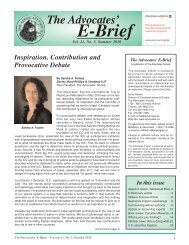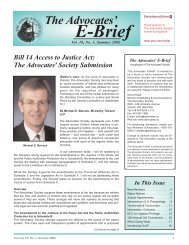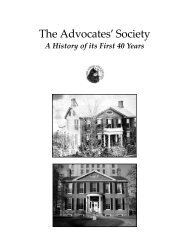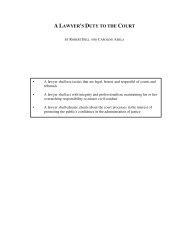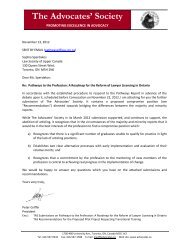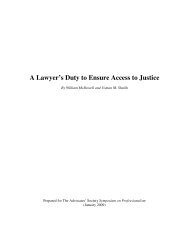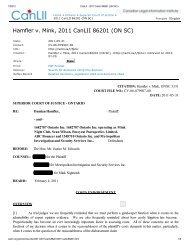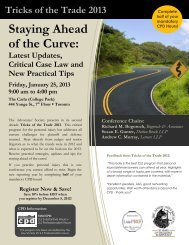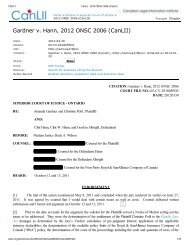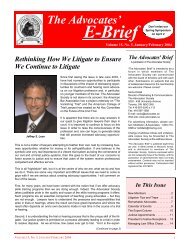Litigation Process a.. - The Advocates' Society
Litigation Process a.. - The Advocates' Society
Litigation Process a.. - The Advocates' Society
Create successful ePaper yourself
Turn your PDF publications into a flip-book with our unique Google optimized e-Paper software.
- 8 -<br />
substantive testimony is given. If counsel wishing to object on this basis waits until after the<br />
substantive testimony is underway, any lack of qualification, regardless of its extent, will only go<br />
to weight as opposed to admissibility. 20 It is also important to carefully assess the precise area<br />
in which the expert is asking permission to testify. For example, it is important in cases where<br />
the expert is retained to tender evidence with respect to the standard of care in a professional<br />
liability case that the expert be qualified in the same field as that of the defendant.<br />
Qualifications of the Expert<br />
Technical expertise of the expert in the relevant field is essential. It is prudent to seek an<br />
expert who possesses the right balance of education, training and experience. 21<br />
Although an<br />
expert may be highly educated and published, lack of experience in the relevant field may affect<br />
the weight that will be given to his evidence in some cases, particularly those where the issue to<br />
which the expert is testifying is the standard of care in professional liability cases. In such cases,<br />
it is expected that the expert testifying as to the requisite standard of care will be a member of<br />
the defendant’s community of the same experience as the defendant who is able to appreciate<br />
all of the circumstances of the particular case. It is best in professional liability cases to retain an<br />
expert with practical experience comparable to that of the defendant. In other cases, however,<br />
where an expert may be required to tender evidence as to economic or sociological trends, a<br />
highly academic background which an established record of peer reviewed research may be<br />
preferable. It is always prudent to consider the source of the expertise and its practical<br />
relevance to the issues at hand.<br />
It is advisable to retain an expert with some previous experience in a courtroom setting.<br />
<strong>The</strong> expert will then know what to expect of examination-in-chief and cross-examination and will<br />
20 “Effective Use of Expert Evidence”, <strong>The</strong> Advocate’s <strong>Society</strong> London 1996 Courthouse Series, February 1, 1996,<br />
pp. 25-7.<br />
21 Otoway B. Denny Jr. “How to Select an en Expert Witness”, Expert Testimony and the Defence of <strong>Litigation</strong>,<br />
Donald J, Hirsch Ed., (Chicago: <strong>The</strong> Defence Research Institute Inc., 1990).<br />
© 2012 <strong>The</strong> Advocates’ <strong>Society</strong>. <strong>The</strong>se materials may not be reproduced, published, distributed<br />
or posted on-line without the written permission of <strong>The</strong> <strong>Advocates'</strong> <strong>Society</strong>.



